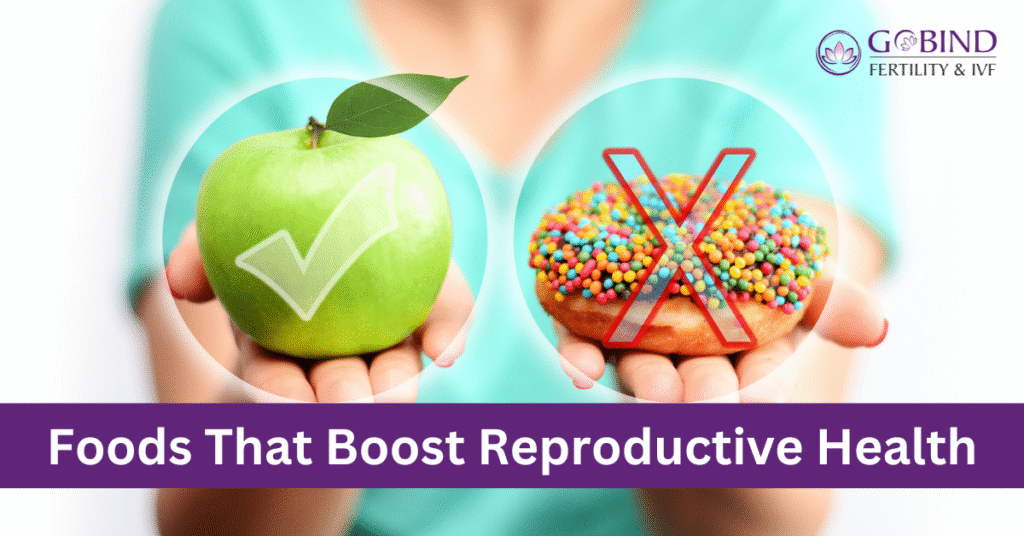Nutrition and Fertility: Foods That Boost Reproductive Health

Your diet may be the most powerful tool in your fertility journey.
Fertility is influenced by various factors—age, genetics, lifestyle choices, environmental exposures, and more. However, one critical yet often overlooked factor is nutrition. The food we eat plays a foundational role in hormone regulation, egg and sperm quality, ovulation, and overall reproductive health.
For couples trying to conceive, optimising nutrition can significantly improve the chances of natural conception and support outcomes of fertility treatments like IVF. This article explores the vital connection between nutrition and fertility and identifies specific foods that can boost reproductive health in both men and women.
Why Nutrition Matters for Fertility
The body requires essential nutrients to produce hormones, maintain ovulatory cycles, develop healthy eggs and sperm, and prepare the uterus for implantation. A nutrient-rich diet can improve:
- Hormonal balance
- Egg and sperm quality
- Blood flow to reproductive organs
- Insulin regulation (in conditions like PCOS)
- Healthy weight maintenance
Conversely, poor eating habits, excessive sugar, trans fats, and processed foods can lead to hormonal imbalances, inflammation, and even conditions like anovulation and poor sperm motility.
Fertility-Boosting Foods for Women
1. Leafy Greens (Spinach, Kale, Swiss Chard)
These are rich in folate, a B-vitamin essential for ovulation and early fetal development. Folate also supports healthy DNA synthesis and reduces the risk of neural tube defects in pregnancy.
2. Berries (Blueberries, Strawberries, Raspberries)
Berries are loaded with antioxidants that combat oxidative stress, which can damage eggs. Their anti-inflammatory properties also support hormone regulation.
3. Full-Fat Dairy
Some studies suggest full-fat dairy is better for female fertility compared to low-fat versions. Whole milk, full-fat yoghurt, and cheese may reduce the risk of ovulatory infertility.
4. Complex Carbohydrates
Whole grains like oats, quinoa, brown rice, and whole wheat provide steady energy and support blood sugar regulation. This is crucial in managing conditions like PCOS (Polycystic Ovary Syndrome), a leading cause of infertility.
5. Healthy Fats (Avocados, Nuts, Seeds, Olive Oil)
Healthy fats are critical for hormone production and egg quality. Omega-3 fatty acids, found in flaxseeds, chia seeds, and walnuts, support reproductive hormone balance.
6. Eggs
Eggs are a fertility superfood, rich in protein, vitamin D, B12, and choline—all essential for reproductive health and fetal development.
Fertility-Boosting Foods for Men
1. Oysters and Zinc-Rich Foods
Zinc is crucial for testosterone production and sperm development. Oysters are the richest source, but pumpkin seeds, chickpeas, and beef are also excellent.
2. Brazil Nuts and Selenium
Selenium is a mineral that supports sperm motility and reduces oxidative stress in sperm cells. Just a few Brazil nuts a day can provide the recommended daily amount.
3. Tomatoes
Rich in lycopene, an antioxidant that may increase sperm count and improve motility. Cooked tomatoes or tomato-based products offer the highest bioavailability.
4. Vitamin C-Rich Foods (Oranges, Bell Peppers, Kiwis)
Vitamin C helps protect sperm from oxidative damage and can improve sperm count and quality.
5. Leafy Greens and Folate
Just like women, men need folate for healthy sperm DNA. Low folate levels are linked to poor sperm function and lower fertility rates.
6. Fish (Salmon, Mackerel, Sardines)
Fatty fish are excellent sources of omega-3 fatty acids, which improve blood flow to reproductive organs and support sperm structure.
Foods That Support Hormonal Balance
Maintaining hormone balance is key to fertility. These foods help regulate estrogen, progesterone, insulin, and other reproductive hormones:
- Flaxseeds – Rich in lignans, which help balance estrogen.
- Cruciferous vegetables (broccoli, cauliflower, Brussels sprouts) – Help the body metabolize excess estrogen.
- Turmeric – Anti-inflammatory and may reduce endometriosis-related pain.
- Cinnamon – Especially helpful for women with PCOS; supports insulin sensitivity.
Fertility-Boosting Meal Plan Ideas
Breakfast:
- Whole-grain toast with avocado, poached egg, and a handful of spinach.
- Greek yogurt with mixed berries, chia seeds, and honey.
Lunch:
- Quinoa salad with chickpeas, cherry tomatoes, cucumber, olive oil, and lemon.
- Grilled salmon with sweet potato and steamed broccoli.
Snacks:
- Brazil nuts and walnuts
- Smoothie with almond milk, banana, spinach, flaxseeds, and berries
Dinner:
- Lentil curry with brown rice and sautéed kale
- Stir-fried tofu with mixed vegetables and sesame oil
What to Limit or Avoid
While certain foods can enhance fertility, others can have a negative impact:
1. Trans Fats
Found in processed snacks and baked goods, trans fats promote inflammation and insulin resistance, both of which are harmful to fertility.
2. Refined Sugars
High sugar intake can lead to insulin resistance and hormonal imbalances, particularly problematic in PCOS.
3. Excess Caffeine
Limit caffeine intake to 200-300 mg per day (about 1-2 cups of coffee), as excessive caffeine may hinder conception.
4. Alcohol
Even moderate alcohol consumption may affect ovulation and sperm quality. Couples trying to conceive should limit or avoid alcohol altogether.
5. Highly Processed Foods
Processed foods often lack essential nutrients and contain preservatives and additives that may disrupt hormone function.
The Role of Supplements
While whole foods should be the foundation of a fertility-focused diet, supplements may be necessary to fill nutritional gaps. Common fertility supplements include:
- Folic acid
- Vitamin D
- Omega-3 fatty acids
- Coenzyme Q10 (especially for egg quality)
- Zinc and Selenium (especially for male fertility)
Before starting any supplement, consult with a fertility specialist or nutritionist for proper dosing and compatibility with your needs.
Conclusion: Small Changes, Big Impact
Nutrition is not a magic cure, but it is a powerful ally in the fertility journey. Making intentional food choices can improve reproductive health, support hormone balance, and even enhance the success of assisted reproductive techniques.
At fertility centres like Gobind Fertility & IVF Centre, nutritional counselling is often part of a comprehensive treatment plan. Patients are encouraged to adopt balanced, nutrient-rich diets to complement medical therapies and improve overall reproductive outcomes.
Whether you’re planning to conceive naturally or undergoing fertility treatments, what you eat truly matters. Investing in your nutritional health today lays the foundation for a healthy pregnancy and a brighter future.
